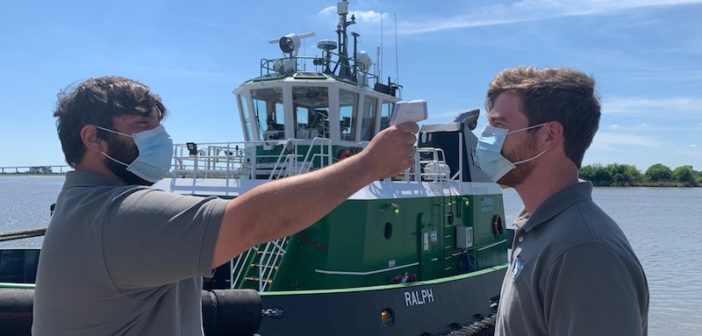As inland river companies continue to enforce health and safety measures to protect employees and vessels from Covid-19, many are encountering resistance from employees.
Some people are rebellious, questioning the need to follow precautions laid out by the company; others are non-believers that the virus is a serious health threat; while others are either ill-informed, confused by conflicting and ever-changing information about the disease and prevention, or feel invincible that they won’t get infected.
These were a few of the observations shared by members of the American Waterways Operators (AWO) during a webinar on Wednesday that explored ways that companies can change the outlook of those who aren’t fully cooperating with new safety protocols.
“The coronavirus is asking all of us in the towing industry and beyond to make unprecedented and rapid changes to our behavior in order to prevent the spread of the disease so that our shore facilities and our vessels can continue to operate,” Marino Hwang, marine compliance manager at McAllister Towing, New York, said in introducing the webinar. “But sometimes not everyone is on board with those changes.”
The purpose of the discussion with Sharon Lipinski, CEO of Habit Mastery Consulting, was to “help us understand where the resistance is coming from, how we can avoid making it worse and what we should do instead,” said Hwang, speaking on behalf of AWO’s Safety Leadership Advisory Panel.
When webinar listeners were asked to rate the compliance with safety rules in their companies, some responded they were getting 50% compliance, while others reported 40% and 10%. One person said most of their staff felt invincible and they questioned the need for rules.
Lipinski said there are many reasons why employees ignore or push back on protocols, and responses to encourage compliance require an understanding of human nature, motivations and people’s personal calculations of risk. Based on these factors, she offered ways to encourage compliance.
- For those employees who are uninformed, they need the right information about the disease and how it spreads, and she said this can be provided through videos and disseminating information from experts, such as the effectiveness of wearing face coverings. “Providing information makes them informed,” she said.
- For those who are confused by bad information, too much information or conflicting reports about Covid-19, this leads to insecurity and hesitation about following directives. This is especially true when national and state leaders offer mixed messages about wearing masks and other preventive measures, and about how the disease affects the body and is spread, she said. The coronavirus is so new that information is constantly changing, which makes it challenging for managers to know what information has staying power when crafting their safety plans.
Her advice is to “be humble and nimble” about the situation and admit that no one has all the answers. Acknowledge that the situation is evolving and will likely change and urge flexibility on the part of everyone. For example, employers can stress that according to the best information available now, face coverings can curb the spread of the virus, and as further information is released, plans will adapt and change.
- For those feeling invincible, it’s important to understand how these people perceive risk. They might be influenced by their past experiences, other people, the news they read, quarantine fatigue or a level of personal vulnerability. They don’t want to appear weak, so they might refuse to admit they are sick. Or perhaps it’s what she calls “tribal,” which expresses itself in an us vs them dynamic in which people rebel and thrive on conflict and disagreement. “Under the right circumstances,” she said, “everyone has a rebel in them.”
She went on to describe three communication styles that can actually discourage compliance. The authoritative approach “treats employees like children” by insisting that the employer knows best. “You want your employees to be critical thinkers,” she said, “so don’t shut this down.”
A dismissive approach fails to recognize employee concerns or questions.
The third is inconsistent communication which will cause uninformed employees to flounder while giving fuel to the rebels. “You want to be honest, transparent and consistent,” she said, and speak in-person or in print to employees. “They want to hear your voice, to know how you’re going to fix a problem and that the problem isn’t forever and this is what will be done in the meantime,” she said. “There is the good, the bad and the I don’t know.”
Lipinski suggests developing a response that focuses on shared values and a human connection. “Start with what you have in common,” she said. “Ask employees directly what is important to them,” like friends, family, the future, and get them involved in the problem solving, such as asking their input on things like designing face masks. But, she added, only ask for their involvement if their suggestions will be implemented or taken seriously. “You want to create a robust feedback culture,” she said. “Build trust and get everyone rowing the boat in the same direction.”
Emphasise that wearing a face mask, for example, also protects friends, families and children. Telling a story is often effective in getting people to pay attention. “Change minds by winning hearts,” she said.
The idea of story telling, agreeing on values and getting employees engaged in a solution can be done right away. “Part of that urgency is that there is so much we don’t know and the consequences are so high,” Lipinski said. “When you start a conversation around values of what’s important to people, then you can talk about what the potential consequences are. Help the employees make the connection between how those potential consequences jeopardize everything that is important to them, and that’s when they get really motivated.“




